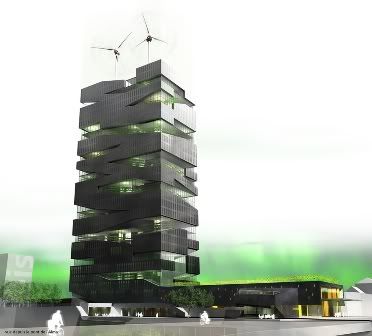bright green
wrote a portion of this in response to a previous entry, explaining my 'bright green' environmental school of thought:
changing the social mindset has to be first and foremost. and it can't be a fad. recent research has actually shown that there has been a drastic increase in recycling over the past few years and not because people want recognition for doing the right thing. which means it has more staying power.
unfortunately, we're progressing so fast that we often don't know how to deal with mass leftovers of our innovation. something we talk about at Greener Gadgets, for example, is that 426,000 cell phones are 'retired' in the U.S. every day. There are so many options to recycle what's known as electronic or e-waste, but the scale is still daunting.

consumption is a whole other issue; to be healthy, we shouldn't be consuming food portions larger than our fist. i think people are getting that slowly. walk around a Whole Foods, Trader Joes, or Wegmans and you'll see an energized group of forward thinking people who are interested in organic and wholesome living. why? because people are scared of processing. they are scared of their tomatoes and what's being done to them. they see their children growing up with new illnesses that we've never diagnosed before and wonder about the inoculations we give them. and they come out in droves for a designer grocery bag.
as we see current (and harmful) forms of energy becoming a limited commodity, perhaps people will also rethink the mansions they live in, because they don't need that space or have the means to fund and maintain it due to rising costs. cities will become crowded, energy will become limited, and we will look to new technologies to help us rework the infrastructure of urban life as we know it.
the technology is there. my college just built a LEED certified dormitory, and there are schools in D.C. that are following suit. even the agriculture industry is starting to think about inevitable urbanization and the prospect of vertical farming, which would allow city dwellers to produce and eat locally, without need for preservatives and all of the other processing that goes into transporting our food across the country.

so does anyone really need more than 500 sf? there's a growing parade of minimalists who would argue no. and then there is this whole other group, like michelle kaufmann in the previous entry, who want to arrive at a system of 'zero energy', or, even better, putting energy back on the grid. and hopefully that becomes affordable.
but whether this will mean anything to the upper echelon, who knows? they won't be hit as hard by the energy crisis, but most likely they consume more than anyone else. you could say the 20th century has been a time of material fetish, where success can be equated to the space and things you own and occupy. just watch MTV Cribs. but that has been the nature of kings, queens and conquerors for thousands of years.
the difference now is, we are reaching a saturation point on our planet. the space and materials are running out. we will either have to fight and destroy each other for them, hoping to maintain our current lifestyles, or arrive at a new thought process where we can all coexist through reasonable consumption, and, most importantly, restoration.